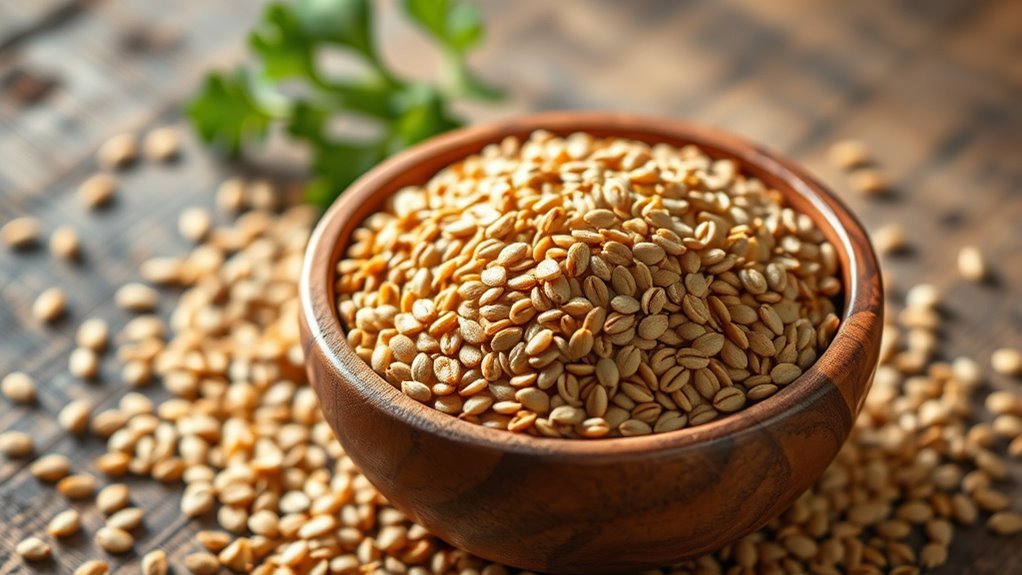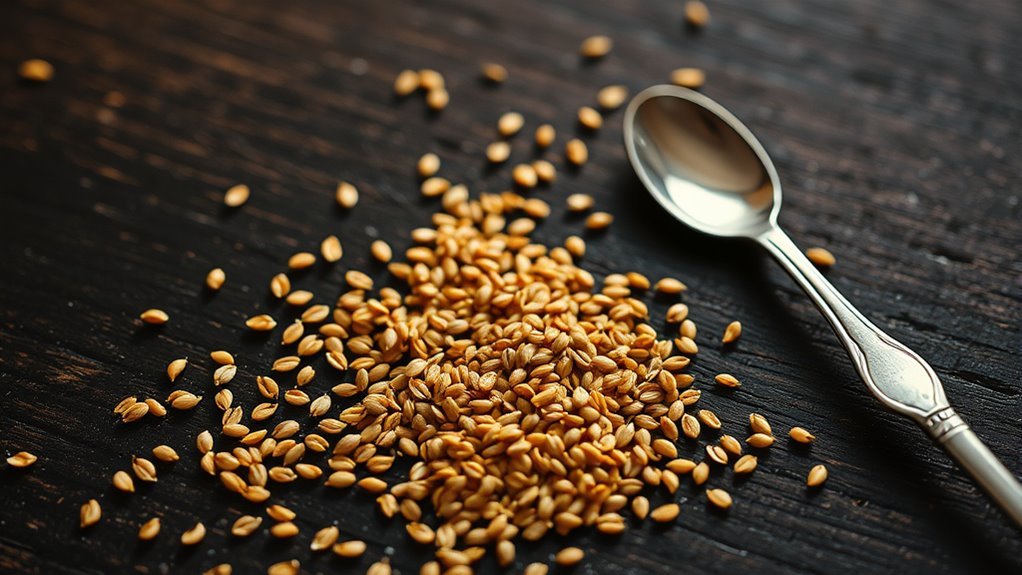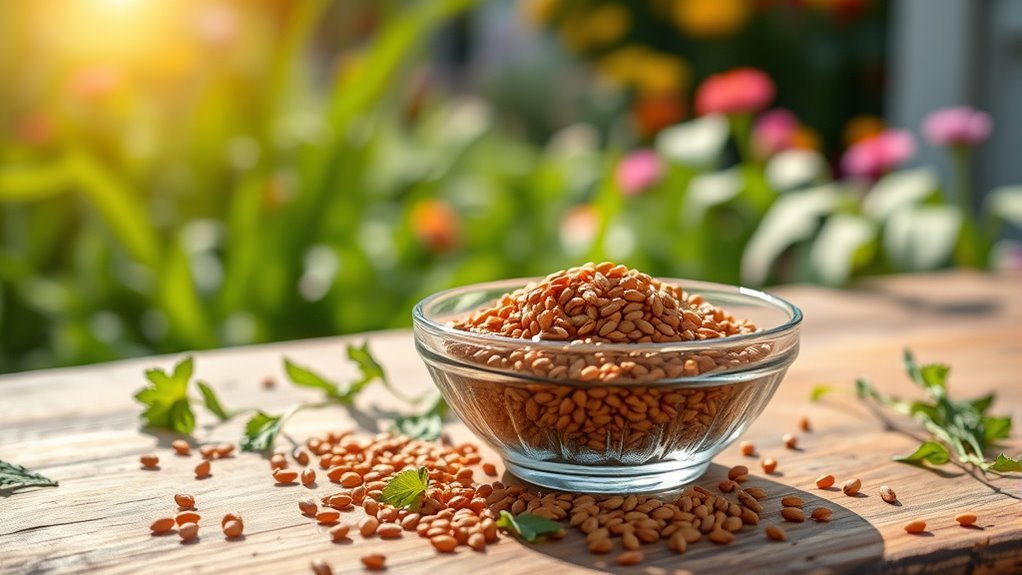Yes, flaxseed is keto-friendly due to its low net carb content and rich nutrient profile. Ground flaxseed has about 0.4 grams of net carbs per tablespoon, making it an excellent option for your keto diet. It’s also packed with healthy omega-3 fatty acids and fiber, which can support heart health and digestion. However, be mindful of portion sizes and potential digestive issues. Learn more about how to incorporate flaxseed into your meals and its health benefits!
Understanding the Keto Diet

When you think about the keto diet, it’s essential to understand its core principles. The keto basics revolve around drastically reducing carbohydrate intake while increasing fats. This shift encourages your body to enter a state of ketosis, where it burns fat for energy instead of carbs. Typically, the diet principles suggest that your macronutrient ratio should be around 70% fat, 25% protein, and only 5% carbohydrates. This balance not only helps in weight loss but can also improve mental clarity and energy levels. However, it’s crucial to focus on healthy fats and nutrient-dense foods. By grasping these fundamentals, you can make informed choices that align with your desire for freedom and flexibility in your eating habits.
Nutritional Profile of Flaxseed

Flaxseed, a tiny powerhouse of nutrition, packs a significant punch for those following a keto diet. It’s rich in essential nutrients that can support your health journey. Importantly, flaxseed is an excellent source of omega 3 fatty acids, which are essential for heart health and reducing inflammation.
Flaxseed is a nutritional gem for keto enthusiasts, packed with omega-3s and essential nutrients for overall health.
Here are some key nutritional highlights of flaxseed:
- Vitamins: Flaxseed contains various flaxseed vitamins, including B vitamins and vitamin E, which are important for energy metabolism and antioxidant protection.
- Fiber: It’s high in dietary fiber, promoting digestive health and satiety.
- Protein: Flaxseed provides a good plant-based protein source, aiding muscle maintenance.
Incorporating flaxseed into your diet can help enhance your nutritional intake while staying aligned with keto principles.
Carb Content in Flaxseed

When considering flaxseed as part of a keto diet, understanding its carb content is essential. Flaxseed is low in net carbs, primarily due to its high fiber content, which can impact your overall carbohydrate intake. Additionally, serving size plays a key role in how flaxseed fits into your daily carb allowance, so it’s important to measure accordingly.
Flaxseed Net Carbs
Understanding the net carbs in flaxseed is essential for anyone following a ketogenic diet. Flaxseed is a popular choice due to its low carbohydrate content, especially when sourced correctly. Here’s what you need to know about flaxseed varieties and their net carbs:
- Whole flaxseed: Approximately 1.5 grams of net carbs per tablespoon.
- Ground flaxseed: Roughly 0.4 grams of net carbs per tablespoon, making it a more favorable option.
- Flaxseed oil: Contains zero net carbs, offering a fat-rich alternative.
When incorporating flaxseed into your diet, consider which flaxseed sources align best with your macro goals. With these options, you can enjoy the benefits of flaxseed while keeping your carb intake in check.
Fiber Content Impact
While many people focus on the net carb content of flaxseed, it’s important to take into account the fiber content, which plays a notable role in its overall carbohydrate profile. Flaxseed is a rich source of dietary fiber, aiding in fiber digestion and helping to maintain digestive health. Understanding the balance of fiber and carbs can empower your dietary choices.
| Fiber Sources | Fiber Content (grams per 100g) |
|---|---|
| Flaxseed | 27 |
| Chia Seeds | 34 |
| Oats | 10 |
| Almonds | 12 |
Incorporating flaxseed into your diet can provide beneficial fiber without greatly impacting your carb goals, making it a valuable addition for those opting for a keto lifestyle.
Serving Size Considerations
Serving sizes play a significant role in determining the carb content of flaxseed, which is essential for those following a keto diet. Understanding portion control can help you enjoy flaxseed while maintaining your carb limits. Here are some serving suggestions to take into account:
- A tablespoon of whole flaxseeds contains about 1.5 grams of carbs.
- Ground flaxseed offers a similar carb count, making it a versatile option.
- Stick to 1-2 tablespoons per day to keep your carb intake in check.
Health Benefits of Flaxseed
Flaxseed offers a range of health benefits that can complement a keto diet effectively. One of the notable flaxseed benefits is its rich omega-3 sources, which support heart health and reduce inflammation. It’s also packed with antioxidant properties that help combat oxidative stress in the body. Incorporating flaxseed into your diet can enhance digestive health, thanks to its high fiber content, promoting regularity. In addition, it may aid in weight management by promoting a feeling of fullness, helping you stay on track with your dietary goals. Moreover, flaxseed supports hormone balance, which can be essential for overall well-being. By embracing these benefits, you’re making a conscious choice for your health and freedom on your keto journey.
How Flaxseed Fits Into a Keto Diet
When considering how to incorporate flaxseed into a keto diet, it’s important to recognize its low carbohydrate content and high fiber profile. Flaxseed can be a fantastic addition, providing numerous benefits while keeping your carb count in check.
Here are some key points to keep in mind:
- Flaxseed Types: Both whole and ground flaxseed can be included, but ground flaxseed is often easier for your body to digest.
- Flaxseed Benefits: It offers omega-3 fatty acids, which are essential for heart health and can help reduce inflammation.
- Versatility: You can easily add flaxseed to smoothies, salads, or keto-friendly baked goods without compromising your diet.
Embracing flaxseed can enhance your keto journey while adding valuable nutrients.
Incorporating Flaxseed Into Your Meals
Incorporating flaxseed into your meals can be both simple and nutritious. You can add it to smoothies, baked goods, or even sprinkle it on salads for an extra crunch. Understanding its nutritional benefits will help you make the most of this versatile ingredient while sticking to your keto diet.
Flaxseed Recipes Ideas
Adding flaxseed to your meals can elevate both the nutritional value and texture of your dishes. It’s incredibly versatile, fitting into various recipes seamlessly. Here are some tasty ideas to get you started:
- Flaxseed smoothies: Blend your favorite fruits with flaxseed for a nutrient-packed drink.
- Flaxseed pancakes: Mix ground flaxseed into your pancake batter for added fiber and healthy fats.
- Flaxseed energy balls: Combine oats, nut butter, and flaxseed for a quick, on-the-go snack.
You can also experiment with flaxseed muffins, granola, salad dressings, chia pudding, or protein bars. Each of these options is a simple way to incorporate this superfood into your diet, enhancing both flavor and nutrition. Enjoy the freedom of creating delicious, healthy meals!
Nutritional Benefits Overview
Flaxseed is a powerhouse of nutrition that can greatly enhance the benefits of your meals. With its impressive nutrient density, you can easily incorporate flaxseed into your diet for a range of health benefits. Below is a quick overview of what you gain by adding flaxseed to your meals:
| Nutrient | Amount per 1 oz (28g) | Health Benefits |
|---|---|---|
| Omega-3 Fatty Acids | 6,388 mg | Supports heart health and reduces inflammation |
| Fiber | 7.7 g | Aids digestion and promotes satiety |
| Protein | 5.2 g | Helps muscle repair and growth |
Flaxseed vs. Other Keto-Friendly Seeds
While many seeds can fit into a keto diet, flaxseed stands out due to its unique nutritional profile. When you compare flaxseed varieties to other keto-friendly seeds, you’ll notice some key differences that make flaxseed particularly appealing.
- High in omega-3 fatty acids
- Rich in fiber, aiding digestion
- Low in net carbs, ideal for keto
In seed comparisons, flaxseed offers more ALA (alpha-linolenic acid) than chia seeds and is lower in carbs than pumpkin seeds. This makes flaxseed not only a great addition to your keto meal plan but also a versatile option. Whether you prefer ground or whole flaxseed, incorporating this superfood can enhance your nutritional intake while keeping you aligned with your keto goals.
Potential Concerns With Flaxseed Consumption
Although flaxseed is often celebrated for its health benefits, there are potential concerns to contemplate before including it in your diet. For some, flaxseed can trigger allergic reactions, leading to discomfort or more severe responses. Additionally, its high fiber content may cause digestive issues, such as bloating or gas, especially if consumed in excess. Furthermore, flaxseed contains phytoestrogens, which can have hormonal effects; this might not be ideal for everyone, particularly those with hormone-sensitive conditions. Finally, it’s worth noting that flaxseed may interfere with nutrient absorption due to its antinutrients, potentially impacting how well your body absorbs essential vitamins and minerals. Always consider these factors to guarantee flaxseed fits well into your individual health journey.
Tips for Buying and Storing Flaxseed
When it comes to incorporating flaxseed into your diet, knowing how to buy and store it properly is essential for maximizing its benefits. Here are some valuable buying tips and storage methods to keep in mind:
- Choose whole or ground: Whole flaxseeds have a longer shelf life, but ground flaxseed offers better nutrient absorption.
- Check for freshness: Look for packaging dates and avoid buying expired or damaged products.
- Store correctly: Keep flaxseed in an airtight container in a cool, dark place. Ground flaxseed is best refrigerated to prevent rancidity.
Frequently Asked Questions
Can Flaxseed Cause Digestive Issues on a Keto Diet?
Flaxseed can cause digestive issues for some people on a keto diet. While it’s a great source of keto fiber, its high content of soluble fiber can lead to bloating or gas if you’re not used to it. It’s important to introduce it gradually and drink plenty of water. If you experience discomfort, you might want to reduce your intake or consider other fiber sources that agree better with your digestion.
How Much Flaxseed Can I Consume Daily on Keto?
You can enjoy about 1 to 2 tablespoons of flaxseed daily on your keto journey. Think of it as a golden key revealing flaxseed benefits like omega-3s and fiber. Start with a tablespoon, then increase as your body adjusts. Monitor how you feel, as everyone’s different. Balancing flaxseed servings with other low-carb foods lets you savor the freedom of variety while reaping its health perks. So go ahead, sprinkle some into your meals!
Are Flaxseed Oil and Whole Flaxseed Equally Keto-Friendly?
Flaxseed oil and whole flaxseed are both keto-friendly, but they offer different benefits. Whole flaxseed provides fiber and essential nutrients, enhancing flaxseed nutrition. This can support digestive health and satiety. On the other hand, flaxseed oil is rich in omega-3 fatty acids, which can reduce inflammation and improve heart health. Incorporating both can maximize flaxseed benefits, so you can enjoy variety in your diet while staying aligned with your keto goals.
Can I Use Flaxseed as a Keto-Friendly Egg Substitute?
Yes, you can use flaxseed as a keto-friendly egg substitute! Imagine a warm, nutty aroma wafting through your kitchen as you mix ground flaxseed with water, creating a gel-like consistency perfect for keto baking. Flaxseed nutrition shines here, providing fiber and healthy fats while keeping carbs low. Just remember, it works best in recipes where eggs are used for binding rather than leavening, ensuring your baked goods turn out deliciously satisfying.
Is Ground or Whole Flaxseed Better for Keto?
Ground flaxseed’s generally better for keto because it’s easier to digest and absorb its nutritional benefits. It has a higher fiber content, which can help with digestion and keep you feeling full longer. Whole flaxseed can pass through your digestive system undigested, meaning you might miss out on those benefits. So, if you’re looking to maximize your intake, go for ground flaxseed to enhance your keto journey while enjoying its health perks.
Frequently Asked Questions
1. Is flaxseed keto-friendly?
Yes, flaxseed is considered keto-friendly due to its low carbohydrate content and high fiber content. With approximately 1.5 grams of net carbs per tablespoon, it can fit well into a ketogenic diet, which typically limits carbohydrate intake to promote ketosis.
2. How can I incorporate flaxseed into my keto diet?
Flaxseed can be incorporated into your keto diet in various ways. You can add ground flaxseed to smoothies, use it as a topping for salads, mix it into keto-friendly baked goods, or use it to make flaxseed meal pancakes. Ground flaxseed is often more digestible, so it’s recommended to use it instead of whole seeds.
3. What are the health benefits of flaxseed on a keto diet?
Flaxseed is rich in omega-3 fatty acids, which can promote heart health, and is an excellent source of dietary fiber, supporting digestive health. Additionally, it contains lignans, which have antioxidant properties. Including flaxseed in a keto diet can help maintain satiety due to its high fiber content, which can be beneficial for weight management.
4. Are there any side effects of consuming flaxseed on a keto diet?
While flaxseed is generally safe for most people, consuming it in large amounts can lead to digestive issues such as bloating or gas due to its high fiber content. It’s advisable to start with small amounts and increase gradually. Additionally, those on anticoagulant medications should consult with a healthcare provider before adding flaxseed to their diet because it may have blood-thinning effects.
5. How does the nutritional profile of flaxseed fit into a keto diet?
Flaxseed is low in carbohydrates and high in healthy fats, making it a suitable addition to a keto diet. One tablespoon of ground flaxseed typically contains about 55 calories, 4.3 grams of fat, 2 grams of protein, and 3 grams of carbohydrates, with about 2 grams of dietary fiber, resulting in 1.5 grams of net carbs. This makes it an excellent choice for maintaining the high-fat, low-carb ratios required on a ketogenic diet.
References
- https://www.ncbi.nlm.nih.gov/pmc/articles/PMC4892318/
- https://www.healthline.com/nutrition/flaxseeds-and-keto
- https://www.webmd.com/diet/obesity/flaxseed
- https://www.medicalnewstoday.com/articles/322200
- https://www.livescience.com/60742-flaxseed-nutrition.html
- https://www.mayoclinic.org/healthy-lifestyle/nutrition-and-healthy-eating/expert-answers/flaxseed/faq-20057868
- https://www.sciencedirect.com/science/article/pii/S2212267216300680
- https://www.wellnessmama.com/61884/flaxseed-health-benefits/
- https://www.journalofnutrition.org/content/134/12/3211S.full


